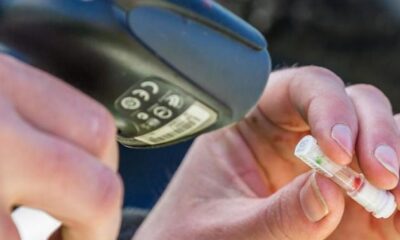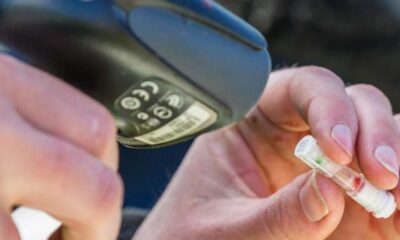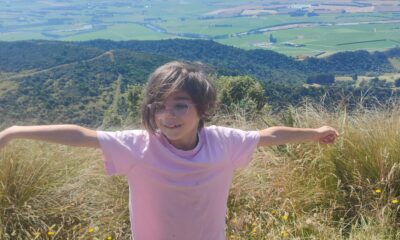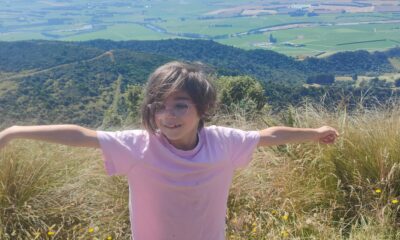Science
Research Study Tracks Facial Eczema Impact on New Zealand Farms
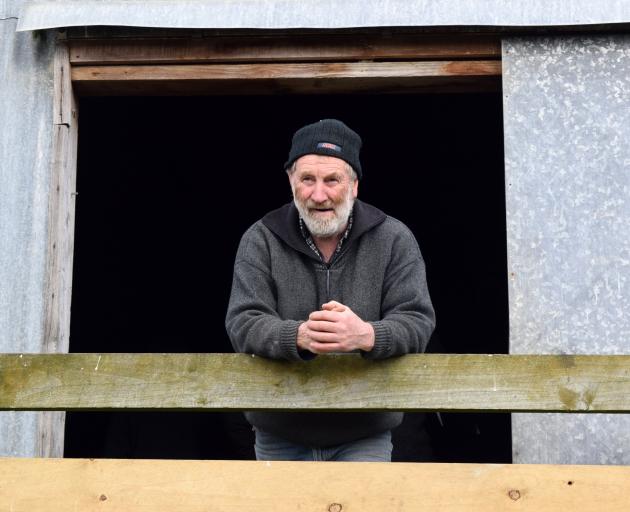
A study by Beef + Lamb New Zealand is investigating how facial eczema affects sheep farms across the country. This research, led by principal scientist Cara Brosnahan, is currently in its third and final season, focusing on fresh sheep manure to understand the prevalence and impact of the disease.
During the second season, researchers detected low levels of facial eczema spores on four farms in Otago and identified spores on one sheep farm in Southland in the first season. All grazing livestock, except horses, may contract the disease by ingesting toxic fungal spores primarily found in ryegrass pastures. Farmers are notified when spores are detected in their manure samples and are encouraged to continue sampling to monitor spore levels. If counts rise, they are advised to consult a veterinarian.
The spores are a naturally occurring fungus, with their numbers fluctuating based on environmental conditions. Often, livestock may not exhibit visible signs of the disease, especially if they have consumed a low level of spores. Dr. Brosnahan noted that hidden signs of infection could manifest as decreased productivity or higher empty rates during pregnancy scans. Clinical symptoms of facial eczema have been confirmed from Northland to the West Coast, with over half of the manure samples from the northern part of the South Island showing these signs.
The study aims to explore how various factors, such as farm elevation, pasture height, and neighboring spore counts, influence the risk of facial eczema. Participation is straightforward and free, requiring farmers to collect manure samples every two weeks from October to May. Beef + Lamb New Zealand provides the necessary kits and covers postage costs. In return for their participation, farmers receive results to assess their risk of facial eczema, a $40 subsidy on faecal egg counts, and a chance to be among 25 farms selected for additional testing.
The importance of the final season cannot be overstated. Dr. Brosnahan emphasized the need for more farmers to participate, particularly those who have never detected facial eczema on their farms. “Those results help build our understanding of this devastating disease,” she said.
Facial eczema can lead to severe liver damage in livestock, resulting in reduced fertility, weight loss, lower milk production, photosensitivity, sunburn, and in extreme cases, death. “There’s no cure so you’ve really got to be on top of the management before that happens,” Dr. Brosnahan warned.
In the southern regions, farmers like Graham Evans, who runs Barr Falls Farm in Owaka, advocate for increased participation in the study. Evans has been collecting and submitting fresh manure samples since the study began, noting that no facial eczema spores have been found on his property. He expressed concern that the disease’s spread to the South is unavoidable, stating, “It doesn’t matter whether you believe in climate change or not. It’s going to happen.”
Evans is motivated to participate, not just for his own flock but for the benefit of future generations of farmers. He hopes to see more southern sheep farmers involved in the study to better understand the varying conditions across different sheep farming environments, from the Catlins to Central Otago and Eastern Southland to Western Southland.
As the study progresses, researchers are keen to solidify their findings and help farmers manage and mitigate the impacts of facial eczema on their livestock, which currently costs the sector over $330 million annually.
-

 World1 week ago
World1 week agoPrivate Funeral Held for Dean Field and His Three Children
-

 Top Stories2 weeks ago
Top Stories2 weeks agoFuneral Planned for Field Siblings After Tragic House Fire
-

 Sports3 months ago
Sports3 months agoNetball New Zealand Stands Down Dame Noeline Taurua for Series
-

 Entertainment3 months ago
Entertainment3 months agoTributes Pour In for Lachlan Rofe, Reality Star, Dead at 47
-

 Entertainment2 months ago
Entertainment2 months agoNew ‘Maverick’ Chaser Joins Beat the Chasers Season Finale
-

 Sports3 months ago
Sports3 months agoSilver Ferns Legend Laura Langman Criticizes Team’s Attitude
-

 Sports4 weeks ago
Sports4 weeks agoEli Katoa Rushed to Hospital After Sideline Incident During Match
-

 Politics2 months ago
Politics2 months agoNetball NZ Calls for Respect Amid Dame Taurua’s Standoff
-

 World2 weeks ago
World2 weeks agoInvestigation Underway in Tragic Sanson House Fire Involving Family
-

 Top Stories2 weeks ago
Top Stories2 weeks agoShock and Grief Follow Tragic Family Deaths in New Zealand
-

 Entertainment3 months ago
Entertainment3 months agoKhloe Kardashian Embraces Innovative Stem Cell Therapy in Mexico
-

 World4 months ago
World4 months agoPolice Arrest Multiple Individuals During Funeral for Zain Taikato-Fox

